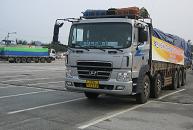
Download South Korean civic groups are delivering hundreds of tons of flour to North Korea.
For the past year, most forms of cross border humanitarian aid had been banned, since Seoul blamed the north for sinking its navy ship in March 2010.
But the South Korean government still isn’t easing its own stance on providing relief, even as the European Union and other international groups prepare to send aid.
And some observers question if North Korea really is as hungry as it says it is.
Reporter Jason Strother was on hand to watch some of the aid depart for the north from a park just seven kilometers south of the Korean demilitarized zone.
A convoy of flatbed trucks, loaded with sacks of flour, pulls out of the Imjingak Peace Park. It’s bound for North Korea.
Rev. In Myung-jin, of the Korea Sharing Movement, says the 300 tons of flour will help feed 22 thousand North Korean children.
But he says aid from charities alone can’t help all those in need.
“Our support through the NGO is very little, not enough to support the starvation in North Korea. So we try to urge our government to support North Korea.”
But even though the government in Seoul now allows private aid to the north, it still won't provide any official assistance.
That’s even as the U-N World Food program warns that many North Koreans face a severe food shortage yet again.
The European Union has its own concerns about providing aid, to North Korea. But earlier this month it announced it will soon dispatch around 14 million dollars worth of relief.
Still the EU’s change of heart hasn't swayed Seoul, says Cho Joong Hoon. He's director of the Humanitarian Assistance division at the South Korean Ministry of Unification.
“The European officials decided to send emergency aid based on what they witnessed after visiting there. Seoul approves of the EU's decision, but it won’t send aid to the North because of current disputes.”
Those include the sinking of a South Korean warship and the bombardment of Yeonpyeong Island, both of which happened last year.
But making sure the food actually reaches those who need it is another concern.
Europe says it's been given unprecedented access to ensure that North Korea's military won't siphon off the aid.
Private aid groups say they're also monitoring food distribution.
Park Chang-il works with an aid group that produces tofu and soy milk at factories in Pyongyang. He says he relies on his North Korean colleagues there.
“When it's possible, we deliver the products to the school or location ourselves. But when we can’t go we ask our North Korean partners to send us pictures or documents showing that the food was distributed to those who need it.”
But some observers say corruption is so endemic in North Korea, that it's impossible to prevent some food aid from being diverted.
Shin Ju Hyun is Chief Editor at The Daily NK, a news website that relies on sources inside North Korea. He says he’s not even sure there’s really a severe food crisis taking place right now.
“Based on what I learned from North Korean defectors and soldiers on a recent trip to the Chinese border, he didn’t feel that the food situation was any worse than it has been in previous years. One difference is that because of a recent currency revaluation, some people who used to buy food on the black market can no longer afford it.”
Shin says despite Pyongyang’s own very public requests for food he thinks the regime might be stockpiling aid for next year.
The north is planning a celebration to mark the 100th birthday of founder Kim Il Sung and it wants to present an image of power and prosperity.
North Korea propaganda analyst Brian Myers says posters began appearing in North Korea in 2008 depicting families sitting at tables with various meats piled on top.
But he says as it became clear that Seoul wasn’t going to send food aid, those images started to change.
“In January 2010, a new poster was issued which showed a vegetarian table, there was no more meat on display. Instead, there was a lot of rice, and potatoes and corn, things the regime could already lay claim to providing its people. And this downscaling of public expectations seems to be continuing even now.”
Myers recently traveled to the north.
He says he saw many children who showed signs of malnutrition, even in relatively affluent Pyongyang.
A sign that the public’s expectations there might be pretty low already.
Vocabs:
01) charity: amal
02) humanitarian aid: bantuan kemanusiaan
03) bound for: menuju ke
04) starvation: kelaparan
05) severe food shortage: kekurangan makanan yang parah
06) dispatch: mengirim/pengiman
07) bombardment: pengemboman
08) piled: ditumpuk
09) downscaling: penurunan harapan
10) affluent: makmur
Questions:
01) What did some NGOs recently send to North Korea and who is for"
02)Why did EU decide to send aid to North Korea and how much will they send?
03) Why doesn't the South Korea government send official aid?
04) What did Park Chang-il say about the distribution?
05) Who is the founder of North Korea and what is the government doing to mark his 100th birthday?













